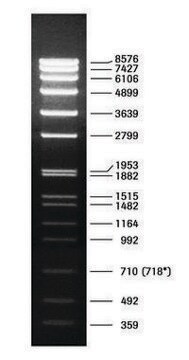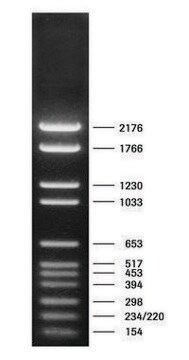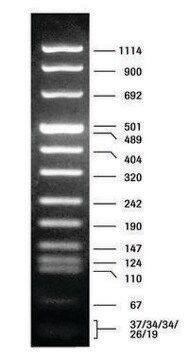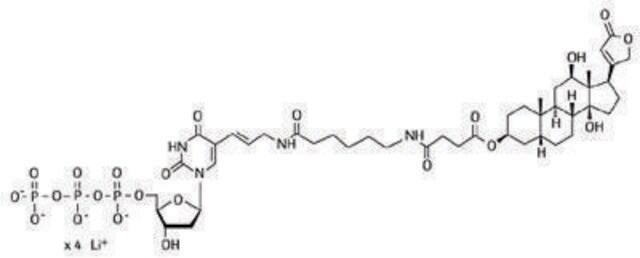11669940910
Roche
DNA Molecular Weight Marker VII, DIG-labeled
Synonyme(s) :
DNA marker
About This Item
Produits recommandés
Forme
solution
Niveau de qualité
Conditionnement
pkg of 500 μL (10 μg/ml)
Fabricant/nom de marque
Roche
Caractéristiques du produit alternatif plus écologique
Designing Safer Chemicals
Learn more about the Principles of Green Chemistry.
sustainability
Greener Alternative Product
Concentration
10 μg/mL
Couleur
colorless
Solubilité
water: miscible
Autre catégorie plus écologique
Température de stockage
−20°C
Description générale
DNA Molecular Weight Marker VII, DIG-labeled is a ready-to-use solution in 10mM Tris-HCl, 1mM EDTA, pH 8.0. The fragment mixture is prepared by cleavage of SPP1 DNA with EcoRI. the size ranges from 0.081 to 8.57kbp.
Application
Séquence
Note: Fragment lengths are derived from computer analysis of the DNA sequence. Depending on the size range of the marker, the smallest fragments will only be visible on overloaded gels.
Autres remarques
Code de la classe de stockage
12 - Non Combustible Liquids
Classe de danger pour l'eau (WGK)
nwg
Point d'éclair (°F)
No data available
Point d'éclair (°C)
No data available
Certificats d'analyse (COA)
Recherchez un Certificats d'analyse (COA) en saisissant le numéro de lot du produit. Les numéros de lot figurent sur l'étiquette du produit après les mots "Lot" ou "Batch".
Déjà en possession de ce produit ?
Retrouvez la documentation relative aux produits que vous avez récemment achetés dans la Bibliothèque de documents.
Les clients ont également consulté
Articles
Digoxigenin (DIG) labeling methods and kits for DNA and RNA DIG probes, random primed DNA labeling, nick translation labeling, 5’ and 3’ oligonucleotide end-labeling.
Notre équipe de scientifiques dispose d'une expérience dans tous les secteurs de la recherche, notamment en sciences de la vie, science des matériaux, synthèse chimique, chromatographie, analyse et dans de nombreux autres domaines..
Contacter notre Service technique





